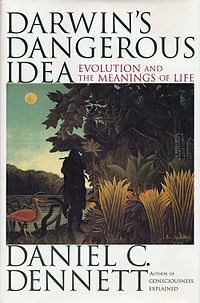
Daniel Clement Dennett III is an American philosopher, writer, and cognitive scientist whose research centers on the philosophy of mind, philosophy of science, and philosophy of biology, particularly as those fields relate to evolutionary biology and cognitive science.

Darwin's Dangerous Idea: Evolution and the Meanings of Life is a 1995 book by the philosopher Daniel Dennett, in which the author looks at some of the repercussions of Darwinian theory. The crux of the argument is that, whether or not Darwin's theories are overturned, there is no going back from the dangerous idea that design might not need a designer. Dennett makes this case on the basis that natural selection is a blind process, which is nevertheless sufficiently powerful to explain the evolution of life. Darwin's discovery was that the generation of life worked algorithmically, that processes behind it work in such a way that given these processes the results that they tend toward must be so.
A meme is an idea, behavior, or style that spreads by means of imitation from person to person within a culture and often carries symbolic meaning representing a particular phenomenon or theme. A meme acts as a unit for carrying cultural ideas, symbols, or practices, that can be transmitted from one mind to another through writing, speech, gestures, rituals, or other imitable phenomena with a mimicked theme. Supporters of the concept regard memes as cultural analogues to genes in that they self-replicate, mutate, and respond to selective pressures.
Memetics is the study of information and culture based on an analogy with Darwinian evolution. Proponents describe memetics as an approach to evolutionary models of cultural information transfer. Memetics describes how an idea can propagate successfully, but doesn't necessarily imply a concept is factual. Critics contend the theory is "untested, unsupported or incorrect". It has failed to become a mainstream approach to cultural evolution as the research community has favored models that exclude the concept of a cultural replicator, opting mostly for gene-culture co-evolution instead.
"Viruses of the Mind" is an essay by British evolutionary biologist Richard Dawkins, first published in the book Dennett and His Critics: Demystifying Mind (1993). Dawkins originally wrote the essay in 1991 and delivered it as a Voltaire Lecture on 6 November 1992 at the Conway Hall Humanist Centre. The essay discusses how religion can be viewed as a meme, an idea previously expressed by Dawkins in The Selfish Gene (1976). Dawkins analyzes the propagation of religious ideas and behaviors as a memetic virus, analogous to how biological and computer viruses spread. The essay was later published in A Devil's Chaplain (2003) and its ideas are further explored in the television programme, The Root of All Evil? (2006).

Alvin Carl Plantinga is an American analytic philosopher who works primarily in the fields of philosophy of religion, epistemology, and logic.

The Brights movement is a social movement whose members since 2003 refer to themselves as Brights and have a worldview of philosophical naturalism.

Psychology of religion consists of the application of psychological methods and interpretive frameworks to the diverse contents of religious traditions as well as to both religious and irreligious individuals. The extraordinary range of methods and frameworks can be helpfully summed up regarding the classic distinction between the natural-scientific and human-scientific approaches. The first cluster proceeds by means of objective, quantitative, and preferably experimental procedures for testing hypotheses regarding the causal connections among the objects of one's study. In contrast, the human-scientific approach accesses the human world of experience using qualitative, phenomenological, and interpretive methods, with the goal of discerning meaningful rather than causal connections among the phenomena one seeks to understand.

In the philosophy of religion, Reformed epistemology is a school of philosophical thought concerning the nature of knowledge (epistemology) as it applies to religious beliefs. The central proposition of Reformed epistemology is that beliefs can be justified by more than evidence alone, contrary to the positions of evidentialism, which argues that while belief other than through evidence may be beneficial, it violates some epistemic duty. Central to Reformed epistemology is the proposition that belief in God may be "properly basic" and not need to be inferred from other truths to be rationally warranted. William Lane Craig describes Reformed epistemology as "One of the most significant developments in contemporary religious epistemology ... which directly assaults the evidentialist construal of rationality."
Pascal Robert Boyer is a French-American cognitive anthropologist and evolutionary psychologist, mostly known for his work in the cognitive science of religion. He taught at the University of Cambridge for eight years, before taking up the position of Henry Luce Professor of Individual and Collective Memory at Washington University in St. Louis, where he teaches classes on evolutionary psychology and anthropology. He was a Guggenheim Fellow and a visiting professor at the University of California, Santa Barbara and the University of Lyon, France. He studied philosophy and anthropology at University of Paris and Cambridge, with Jack Goody, working on memory constraints on the transmission of oral literature.

Religion Explained: The Evolutionary Origins of Religious Thought is a 2001 book by cognitive anthropologist Pascal Boyer, in which the author discusses the evolutionary psychology of religion and evolutionary origin of religions.

John F. Haught is an American theologian. He is a Distinguished Research Professor at Georgetown University. He specializes in Roman Catholic systematic theology, with a particular interest in issues pertaining to physical cosmology, evolutionary biology, geology, and Christianity.

Dawkins' God: Genes, Memes, and the Meaning of Life is a book by Alister McGrath, a theologian who is currently Professor of Historical Theology at Oxford University. The book, published in 2004, with a second edition in 2015, aims to refute claims about religion made by another well-known professor at Oxford, Richard Dawkins. McGrath's book does not seek to demonstrate how Dawkins’ claims differ from Christianity, rather, it argues that Dawkins' arguments fall far short of the logical and evidence-based reasoning that Dawkins himself espouses.
Justin L. Barrett is an American experimental psychologist, Founder and President of Blueprint 1543, a nonprofit organization. He formerly was the Director of the Thrive Center for Human Development in Pasadena, California, Thrive Professor of Developmental Science, and Professor of Psychology at Fuller Graduate School of Psychology. He previously was a senior researcher and director of the Centre for Anthropology and Mind at the Institute for Cognitive and Evolutionary Anthropology at the University of Oxford.
Cognitive science of religion is the study of religious thought and behavior from the perspective of cognitive science, and often engages with evolutionary science, which it assumes is its foundation. The field employs methods and theories from a wide range of disciplines, including cognitive psychology, evolutionary psychology, cognitive anthropology, artificial intelligence, developmental psychology, and archaeology. Scholars in this field seek to explain how human minds acquire, generate, and transmit religious thoughts, practices, and schemas by means of ordinary cognitive capacities.
The evolutionary psychology of religion is the study of religious belief using evolutionary psychology principles. It is one approach to the psychology of religion. As with all other organs and organ functions, the brain's functional structure is argued to have a genetic basis, and is therefore subject to the effects of natural selection and evolution. Evolutionary psychologists seek to understand cognitive processes, religion in this case, by understanding the survival and reproductive functions they might serve.

The Portable Atheist: Essential Readings for the Nonbeliever (2007) is an anthology of atheist and agnostic thought edited by Christopher Hitchens.

The Evolution of God is a 2009 book by Robert Wright, in which the author explores the history of the concept of God in the three Abrahamic religions through a variety of means, including archaeology, history, theology, and evolutionary psychology. The patterns which link Judaism, Christianity, and Islam and the ways in which they have changed their concepts over time are explored as one of the central themes.
The term New Atheism was coined by the journalist Gary Wolf in 2006 to describe the positions promoted by some atheists of the twenty-first century. New Atheism advocates the view that superstition, religion and irrationalism should not simply be tolerated. Instead, they should be countered, criticized, and challenged by rational argument, especially when they exert undue influence, such as in government, education, and politics.
Wesley J. Wildman is a contemporary Australian-American philosopher, theologian, and ethicist. Currently, he is a full professor at the Boston University School of Theology, founding member of the faculty of Computing and Data Sciences, and convener of the Religion and Science doctoral program in Boston University's Graduate School. He is executive director of The Center for Mind and Culture, founding co-director of the Institute for the Biocultural Study of Religion, and founding co-editor of the journal Religion, Brain & Behavior. Wildman's academic work has focused on interpreting religion and building theories of religious beliefs, behaviours, and experiences that acknowledge value in longstanding traditions while attempting to remain intellectually viable in light of the biological, cognitive, evolutionary, physical, and social sciences. He is an important figure in the religion and science field, along with scholars such as Robert John Russell, Nancey Murphy, and John Polkinghorne.












